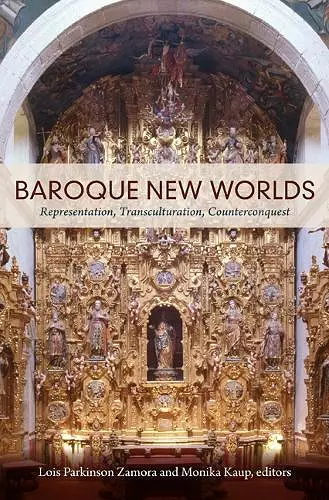Baroque New Worlds
Representation, Transculturation, Counterconquest
Monika Kaup editor Lois Parkinson Zamora editor
Format:Hardback
Publisher:Duke University Press
Published:13th Jul '10
£116.00
Supplier delay - available to order, but may take longer than usual.

An interdisciplinary anthology that charts the enormous importance of the baroque to the cultural life of the western hemisphere, from the 17th century into the present.
Traces the changing nature of Baroque representation across European and Latin American cultures, from an imperial aesthetic encoding Catholic ideologies, into a means of resistance to colonialism, into a mode of postcolonial self-definition.Baroque New Worlds traces the changing nature of Baroque representation in Europe and the Americas across four centuries, from its seventeenth-century origins as a Catholic and monarchical aesthetic and ideology to its contemporary function as a postcolonial ideology aimed at disrupting entrenched power structures and perceptual categories. Baroque forms are exuberant, ample, dynamic, and porous, and in the regions colonized by Catholic Europe, the Baroque was itself eventually colonized. In the New World, its transplants immediately began to reflect the cultural perspectives and iconographies of the indigenous and African artisans who built and decorated Catholic structures, and Europe’s own cultural products were radically altered in turn. Today, under the rubric of the Neobaroque, this transculturated Baroque continues to impel artistic expression in literature, the visual arts, architecture, and popular entertainment worldwide.
Since Neobaroque reconstitutions necessarily reference the European Baroque, this volume begins with the reevaluation of the Baroque that evolved in Europe during the late nineteenth century and the early twentieth. Foundational essays by Friedrich Nietzsche, Heinrich Wölfflin, Walter Benjamin, Eugenio d’Ors, René Wellek, and Mario Praz recuperate and redefine the historical Baroque. Their essays lay the groundwork for the revisionist Latin American essays, many of which have not been translated into English until now. Authors including Alejo Carpentier, José Lezama Lima, Severo Sarduy, Édouard Glissant, Haroldo de Campos, and Carlos Fuentes understand the New World Baroque and Neobaroque as decolonizing strategies in Latin America and other postcolonial contexts. This collection moves between art history and literary criticism to provide a rich interdisciplinary discussion of the transcultural forms and functions of the Baroque.
Contributors. Dorothy Z. Baker, Walter Benjamin, Christine Buci-Glucksmann, José Pascual Buxó, Leo Cabranes-Grant, Haroldo de Campos, Alejo Carpentier, Irlemar Chiampi, William Childers, Gonzalo Celorio, Eugenio d’Ors, Jorge Ruedas de la Serna, Carlos Fuentes, Édouard Glissant, Roberto González Echevarría, Ángel Guido, Monika Kaup, José Lezama Lima, Friedrich Nietzsche, Mario Praz, Timothy J. Reiss, Alfonso Reyes, Severo Sarduy, Pedro Henríquez Ureña, Maarten van Delden, René Wellek, Christopher Winks, Heinrich Wölfflin, Lois Parkinson Zamora
“Because it provides a masterful synthesis of the field (and because it
offers the first published translations of essential works written in Spanish, French, and Portuguese), the anthology (29 essays in total) is sure to become a mandatory first stop for all scholars of the Baroque. . . . Baroque New Worlds is a groundbreaking contribution for the study of transatlantic cultures,
and unusual attention to detail and presentation makes Zamora and Kaup’s volume user-friendly. . . . Baroque New Worlds reminds us that, in addition to compiling and reprinting texts, an anthology can be an intellectual tour de force in its own right.” - Antonio Barrenechea, Comparative American Studies
“Representing a step forward in understanding a tradition still productive in its multiplicity, this inclusive, sophisticated book highlights the trajectory of the baroque, which is sometimes submerged or ignored, but always developing into richer, more complex artifacts. Recommended.” - O. B. Gonzilez, Choice
“Zamora and Kaup's book represents a new refashioning of the term Baroque, as well as usefully engaging the term ‘Neo-Baroque’ that reinvigorates and resituates discussions in the field of aesthetics and cultural criticism.” - Pamela H. Long, The Comparatist
“Baroque New Worlds: Representation, Transculturation, Counterconquest is an important and often captivating anthology that brings together key thinkers and formative writings on the aesthetic, political, and cultural dimensions of the Baroque. Embracing a transhistorical approach, Lois Parkinson Zamora and Monika Kaup develop a rich understanding of the labyrinthine and slippery nature of the Baroque—from its European origins, to its adaptation within a New World context, to its Neobaroque metamorphosis in the twentieth and twenty-first centuries. This is a meticulously edited work that promises to become a key text on the Baroque and Latin American culture.”— Angela Ndalianis, author of Neo-Baroque Aesthetics and Contemporary Entertainment
“Baroque New Worlds demonstrates the great and continuing usefulness of ‘Baroque’ as a way of making connections that might otherwise be hard to see, and of giving visibility to a large, important, and still-unfolding event in cultural history.”—Gordon Braden, author of Petrarchan Love and the Continental Renaissance
“Because it provides a masterful synthesis of the field (and because it offers the first published translations of essential works written in Spanish, French, and Portuguese), the anthology (29 essays in total) is sure to become a mandatory first stop for all scholars of the Baroque. . . . Baroque New Worlds is a groundbreaking contribution for the study of transatlantic cultures, and unusual attention to detail and presentation makes Zamora and Kaup’s volume user-friendly. . . . Baroque New Worlds reminds us that, in addition to compiling and reprinting texts, an anthology can be an intellectual tour de force in its own right.” -- Antonio Barrenechea * Comparative American Studies *
“Representing a step forward in understanding a tradition still productive in its multiplicity, this inclusive, sophisticated book highlights the trajectory of the baroque, which is sometimes submerged or ignored, but always developing into richer, more complex artifacts. Recommended.” -- O. B. Gonzilez * Choice *
“Zamora and Kaup's book represents a new refashioning of the term Baroque, as well as usefully engaging the term ‘Neo-Baroque’ that reinvigorates and resituates discussions in the field of aesthetics and cultural criticism.” -- Pamela H. Long * Comparatist *
ISBN: 9780822346302
Dimensions: unknown
Weight: 934g
688 pages